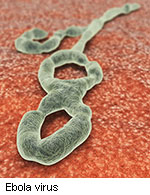
FRIDAY, Aug. 1, 2014 (HealthDay News) — An American who is battling the Ebola virus in West Africa will be flown to the United States for treatment over the next few days, according to staff at Emory University Hospital in Atlanta.
The name of the patient is not yet being released, but there are two known American patients currently fighting Ebola in medical centers in Monrovia, Liberia: Dr. Kent Brantly, 33, and Nancy Writebol, 59. Both had been working at clinics in Liberia, helping victims of an outbreak that the World Health Organization says has already killed at least 729 people.
Both patients are described as being in stable but grave condition.
According to NBC News, Emory said Thursday that it was preparing a special isolation ward to receive the Ebola patient “within the next several days.”
A plane rigged with special equipment designed to contain the virus and care for the patient during flight will carry the individual to Atlanta, with help from the U.S. Centers for Disease Control and Prevention, NBC News reported.
A State Department spokesman told the news network that, “The CDC has devised plans and equipment to do it safely. Patients were evacuated in similar ways during the SARS outbreak in 2003 and in cases involving drug-resistant tuberculosis in 2007.”
According to Emory, the patient will be cared for in a special isolation unit with “”equipment and infrastructure that provide an extraordinarily high level of clinical isolation.” The hospital told NBC that its staff is regularly trained “in the specific and unique protocols and procedures necessary to treat and care for this type of patient.”
There’s no cure or vaccine for Ebola, which wreaks life-threatening havoc on the body by attacking multiple organ systems simultaneously.
Instead, doctors must fall back on the basics of “good, meticulous intensive care,” supporting the patient and targeting treatment toward organs that are under attack, explained Dr. Lee Norman, chief medical officer for the University of Kansas Hospital and an expert on the disease.
“You treat the things that are failing,” Norman said. “If a person is dehydrated, you treat them with IV fluid support. If a person has respiratory failure, you put them on a ventilator.”
As the disease progresses, the impact in terms of illness is “additive,” Norman noted. “Every time you add another organ system that’s failing, a person’s chance of survival goes down exponentially.”
The human body responds to this multiple-pronged attack by initiating a massive and intense inflammatory response — which actually adds to the damage being done, Hirsch noted.
“It’s a combination of the viral destruction and the inflammation that takes place in response that’s so life-threatening to us,” he said.
Ebola’s ravages are such that even young, healthy patients, who usually can fight off most serious illnesses, have a high death rate, explained Dr. Bruce Hirsch, an infectious diseases specialist at North Shore University Hospital in Manhasset, N.Y.
Pumping fluids into patients remains the best front-line treatment for Ebola, to limit the damage caused by inflammation, Hirsch said.
Beyond that, doctors must pay close attention to the patient and be ready to treat whatever organs are on the verge of failure, Hirsch and Norman said.
It doesn’t sound like much, but this basic care can dramatically enhance chances of survival.
“If you look at the overall statistics, the mortality rate is around 50 to 60 percent, but if you get out into remote areas the mortality rate increases to around 90 percent,” Norman said. “I think that reflects the fact that if more care is given and care is given early, the more survival improves.”
On Thursday, the CDC issued a travel warning for the West African countries affected by the Ebola outbreak.
The “Level 3 travel advisory” urges that all non-essential travel to the affected countries — Guinea, Liberia and Sierra Leone — be avoided.
“The bottom line is that Ebola is worsening in West Africa,” CDC Director Dr. Tom Frieden told reporters in a press briefing.
He said the travel advisory will allow those countries to focus on the outbreaks without worrying about new people coming into the region, while keeping air travel open to people who are headed to the countries to provide medical aid.
He also said that the outbreak has been bad in part because these countries haven’t dealt with Ebola before and weren’t prepared for it.
In the meantime, putting a halt to the epidemic is “not going to be quick. It’s not going to be easy. But we know what to do,” Frieden said. He said that the CDC is sending 50 additional experts to the region over the next month.
More information
For more on the Ebola virus, visit the
U.S. Centers for Disease Control and Prevention.
Copyright © 2024 HealthDay. All rights reserved.

